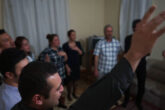
Message Excerpt by Dorothy Kisaka.
The biblical Book of Esther is set in the Persian capital of Susa in the third year of the reign of the Persian king Ahasuerus. Queen Esther’s people, the Jews were in trouble. They were faced with imminent death, and the man responsible for this grave danger was someone highly respected in the kingdom. His name was Haman.
The king had elevated Haman and given him a seat of honor higher than all the other nobles. The king had also directed the royal officials at the gate to kneel down to him and and pay honor to him. However, there was one stubborn officer called Mordecai who refused to bow down.
Mordecai was Esther’s cousin.
Haman was so incensed by the behavior of this man that he devised a plan to get rid of him. But because of his great anger, he said, he will not kill only Mordecai. He wanted to kill the whole people called the Jews throughout the kingdom of Xerxes.
When Mordecai learnt of the impending death of all the Jews, he tore his clothes, put on sackcloth and ashes, and went out into the city, wailing loudly and bitterly.
Esther heard about it and she was horrified. She sent people to find out what was troubling Mordecai and why.
Her messenger told her what the problem was. Esther said, ‘what can I do?’ All the people in the palace knew that you cannot approach the king unless he invites you. And he hadn’t called Esther for 30 days.
She sent a message to Mordecai saying even though she was Queen, she could do nothing since she couldn’t approach the king without his visitation. When Mordecai heard Esther’s words, he sent back a rather tough message to his cousin.
Esther 4:12 reads:
“When Esther’s words were reported to Mordecai, he sent back this answer: “Do not think that because you are in the king’s house you alone of all the Jews will escape. For if you remain silent at this time, relief and deliverance for the Jews will arise from another place, but you and your father’s family will perish. And who knows but that you have come to your royal position for such a time as this?”
In the proceeding verses, Esther sent this reply to Mordecai: “Go, gather together all the Jews who are in Susa, and fast for me. Do not eat or drink for three days, night or day. I and my attendants will fast as you do. When this is done, I will go to the king, even though it is against the law. And if I perish, I perish.”
So Mordecai went away and carried out all of Esther’s instructions.
There are two key lessons for us in Esther’s story:
A Spiritual Mission.
Esther realized that there was a possibility of death in going before the King without an invitation. She weighed it in her heart and said, ‘if I die I die.’ In my own words, I’ll call it ‘a suicide mission’. But as we know, she didn’t die. In fact, the king held out his scepter and she made her request before the king.
What is important to note is that Esther scorned the possibility of death, to accomplish a mission of standing in the gap for her people, the Jews.
This year, the fear of death has gripped the whole world. Globally, everybody is scared of death. We have taken precautions as families, as individuals, as churches and as nations. We are washing hands like we’ve never done before. We are using sanitizers, we have socially distanced ourselves from each other. We stopped hugging and shaking hands – the things that we naturally do as a people. And we’ve even stopped meeting as Church. Why? Because we might contract a deadly disease which might kill us. The fear of death is so real.
Esther despised death, and said, ‘If I perish, I perish.’ ‘Who knows that I may have come into the kingdom for such a time as this,’ that’s what Mordecai, her mentor told her.
I believe we are given different assignments in life. And some assignments are at the very front line, where death may occur, as is the case for Esther.
We have health workers, for instance, in this pandemic on the front-line. We have our task forces on different front-lines, providing leadership, giving out food. We have the police, the LDU’s, the transporters, the gatekeepers at the border serving in various ways.
This is your mission and your assignment in this time.
I was recently assigned some responsibility in this COVID pandemic, and one of the many messages I received from my church family is: ‘We are praying for you. Be careful.’ One can’t help but sense a ‘social distancing’ in the message, as if the assignment will transmit some kind of disease. I think people even fear to call me, perhaps, not wanting to associate with the plague.
Not every mission that we are given is glamorous. Not every assignment that you are given is comfortable. However, every mission assigned by God is a front line he has assigned to you. And He is ultimately the one who appoints you. That is the Lord God, your father. And when He assigns you a mission, you take it with joy. You take it with courage, because it is Him who is sending you.
10 years ago, I received an assignment to serve with the electoral commission of a political party. At that time, I was running a law firm and generally minding my own business.
We laid it before the Lord in prayer, and agreed that this is an assignment that we must do. However brethren, that season was very interesting. I experienced unprecedented ‘social distancing’ within the Church family. I used to be a regular speaker at conferences and Churches, but the invitations just waned until they stopped. In fact, some people I could say, actively avoided me. And yet even some befriended me.
My husband and I knew this was an assignment that we had to do. It wasn’t glamorous. It wasn’t exciting because I was coming from a different walk of career into another. But I had to do it.
Each of us, in different times, you sense the Lord telling you take on a particular assignment. He says, ‘It is me sending you to that front line. And it is me who will strengthen you on that front line.’ Who knows that all the preparations God has made in your life could be for a time like this.
The Christian life is a crucified life, which Paul said in his letter to the Philippians that: “I have been crucified with Christ. It is no longer I who live, but Christ who lives in me. And the life I now live in the flesh I live by faith in the Son of God, who loved me and gave himself for me.”
The life we live as Christians is to serve the purpose of our God: To live in relationship with Him, and to be faithful stewards, wherever He sends us.
We go where He sends us, and do what He calls us to do, whether it’s popular, whether it’s glamorous, or not glamorous. Our lives belong to Christ, whether we live or die.
We belong to Him. It is testified of Jesus in the book of Hebrews 12:2: “For the joy set before him he endured the cross, scorning its shame, and sat down at the right hand of the throne of God.”
At one time, Jesus said, “My food is to do the will of Him who sent Me and to finish His work.” (John 4:34).
That is what we draw from the story of Esther: She had prepared to be a queen for 12 months. She had been bathing in perfumes and aloe vera and all those things that make the skin glow and look beautiful, and a time for how greatest moment had come. She didn’t know that, but in a reflection, her cousin tells her, who knows whether all the preparations you’ve been going through is for such a time as this.
Dear brethren, there is an assignment on your life. And when the time comes, don’t shun it, take it upon yourself.
Spiritual Preparation.
This is the second lesson that I draw from the story of Esther.
Once Esther understood the gravity of the problem, she automatically transformed into a warrior girl.
She told Mordecai, “Go, gather together all the Jews who are in Susa, and fast for me. Do not eat or drink for three days, night or day. I and my attendants will fast as you do. When this is done, I will go to the king, even though it is against the law. And if I perish, I perish.”
Spiritual battles require spiritual preparation. Spiritual missions do not get their preparations from physical preparations but from spiritual preparation. In the Christian life, we do not wrestle against flesh and blood, but against principalities, against powers against rulers in heavenly places.
Scripture clearly teaches us that the weapons of our Christian warfare are not canal, yet they are so mighty through God to the pulling down of strongholds and defeating enemies and dethroning anything that exalts itself against the Word of the Lord.
We see this in the scriptures over and over, people who seemingly engaged in a spiritual preparation which didn’t make sense, but yet it brought great victory. Think of the Israelites walking around the walls of Jericho. It doesn’t make sense in the physical. How do you want to win a city by praising and walking around? But it is a spiritual weapon. And the secret about the spiritual weapon is that you may not see what is happening in the physical, but there is something definitely happening in the spiritual.
Esther mobilized a spiritual weapon of fasting.
She knew she cannot attain physically that which is opposed spiritually. Spiritual preparation is acknowledging that God is the Lord of the battle. It’s humbling ourselves. It’s an act of faith. It is calling upon the power of God to intervene on our behalf.
Fasting is a powerful spiritual weapon. I personally learned about fasting when I was 14 years old. That is when I was first confronted with the benefits of fasting.
Esther knew that there’s a spiritual preparation needed for a spiritual mission.
Success comes through preparation. Prepare everyday. Build a brick for the life that you want to live.
Of late one of the key meditations for most families has been about Holy Communion, eating bread and drinking the wine. The scripture says, every time you do this act, you proclaim the Lord’s death, and the Lord’s death is the Lord’s victory. The Lord’s death is the victory of the cross. It is the victory of the believer.
In conclusion, I want to remind us of two big questions in life. The first question that most people ask is; ‘Who am I?’, and the second question is; ‘Why am I here?’
Esther gives us an example of how this question is answered. She said, at the time when it counted most, ‘I am a Jew.’ She identified herself with her people. And by doing so, she identified herself with her mission.
Why are you here? My answer is that I’m a disciple of Jesus Christ and I will serve the purpose of God in my generation. And if I perish, I perish.
Don’t be afraid to identify yourself with Christ’s death. You are a disciple because of Christ’s death. The identity of the Christian is in the death of Christ. It is His death that brought us life.
Romans 6:4 says, ‘For we died and were buried with Christ by baptism. And just as Christ was raised from the dead by the glorious power of the Father, now we also may live new lives.’
Galatians 2:20 says, ‘I have been crucified with Christ. It is no longer I who live, but Christ who lives in me. And the life I now live in the flesh I live by faith in the Son of God, who loved me and gave himself for me.’
The Apostle Paul put it this way, ‘For to me, to live is Christ, and to die is gain.’ (Philippians 1:21).
Esther’s message to us is that when push comes to shove, don’t deny your identity. You are a disciple. You have died with Christ. And when push comes to shove, embrace the assignment God has given you, whether it’s glamorous, or not glamorous.
Whatever front line God has put you, may be in your household, may be in government, may be in an NGO, whatever place God has given you, embrace your mission and finish your mission.
And if I perish, I perish.
This sermon was given by Mrs Dorothy Kisaka in April 2020, for an online service at St. Francis Chapel Makerere in Kampala. Mrs Kisaka is the newly nominated Kampala Capital City Authority (KCCA) Executive Director.

